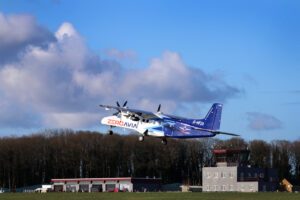 Exploring Cryo-Compressed Hydrogen for Extended Flight Times and Sustainable Growth in the Aviation Sector
Exploring Cryo-Compressed Hydrogen for Extended Flight Times and Sustainable Growth in the Aviation Sector
by DRONELIFE Staff Writer Ian J. McNabb
As hydrogen powered aviation matures, hydrogen aircraft engine developer ZeroAvia and hydrogen infrastructure company Verne recently announced a strategic partnership, signing an MOU to evaluate the opportunity to use cryo-compressed hydrogen (CcH2) to fuel aircraft and for conducting CcH2 refueling from gaseous hydrogen (GH2) and liquid hydrogen (LH2) sources.
Hydrogen-Powered Aviation
Verne is a company focused on cryo-compressed hydrogen solutions for the heavy transportation space. By storing hydrogen at extremely low temperatures, the energy density is increased, possibly enabling extended flight times over gaseous hydrogen-powered aircraft. Verne says that their cryo-compressed hydrogen can achieve over 40% higher energy density than LH2 and 300% higher energy density than 350 bar gaseous hydrogen, in addition to reducing densification costs and refueling time and increasing dormancy periods.
The partnership will be focused on bringing Verne’s technology to airports, starting in California. Verne has already developed a system capable of 4MWh of storage, and recently unveiled a new 1 MWh CcH2 storage prototype alongside the Lawrence Livermore National Laboratory,
Sergey Kiselev, Chief Business Officer at ZeroAvia, said, “With our engines just a few years from flying passengers and cargo, it is important for us that we find the optimal solutions to support airport hydrogen ecosystems. Increasing storage capacity and refueling speed using novel technologies is an important avenue for scaling up hydrogen aviation, and we’re delighted to work with Verne on assessing the role of cryo-compressed hydrogen.”
Ted McKlveen, Chief Executive Officer & Co-Founder at Verne, said, “Aviation is a massive potential market for Verne, as it becomes clear that hydrogen is critical to tackling the industry’s climate impact. Airports can be centers of hydrogen activity, with co-located hydrogen demand for aircraft, airport ground operations, and on-road commercial transportation. Cryo-compressed hydrogen has a key role in optimizing this ecosystem.”
ZeroAvia has made headlines for its hydrogen-powered aircraft engines, which are currently capable of powering up to 20-seat planes. Development is underway on a prototype of the ZA2000 that can power up to a 76-seat aircraft.
In other recent news, ZeroAvia announced that MEHAIR, a leading aviation service provider in the Indian sub-continent, has placed a conditional order for up to 20 ZA600 hydrogen-electric engines. This order contributes to ZeroAvia’s impressive tally of over 2,000 engine pre-orders.
MEHAIR, known for its services across the region since 2011, plans to expand on sub-regional routes in India using both amphibian and wheeled aircraft. The company is exploring financing options, including collaboration with potential leasing partners, and has an existing relationship with MONTE as its preferred ZA600 lessor partner.
ZeroAvia and MEHAIR will collaborate on establishing fuel supply for MEHAIR’s services across India. ZeroAvia aims to certify the ZA600 by the end of 2025, aligning with India’s ambitious goals for hydrogen as a clean energy source in aviation.
With India’s aviation sector rapidly growing, the introduction of hydrogen-electric engines aligns with the country’s clean energy aspirations. MEHAIR’s Managing Director, Siddharth Verma, expressed enthusiasm for spearheading this sustainable aviation revolution in partnership with ZeroAvia and the Government of India. The hydrogen-electric engines offer lower operating costs and zero-emission flight, supporting the growth of regional aviation and MEHAIR’s operations.
More information on ZeroAvia is available here: more information on Verne is available here. More information on MEHAIR can be found here.
Read more:
- ZeroAvia and ScottishPower: Pioneering Hydrogen Infrastructure for Zero-Emission Aviation
- HevenDrones Introduces H2D200 Series, a Hydrogen-Powered Drone Line, at Monaco Hydrogen Forum
- Kelluu Hydrogen Powered Airships on the Drone Radio Show! Revolutionizing Aerial Data Collection
- Creating Hydrogen from Seawater Could Be a Game Changer for the Aerospace Industry
- Could Hydrogen Be the Power Source the Drone Industry is Looking for? [DRONELIFE Exclusive Op-Ed]
Ian McNabb is a staff writer based in Boston, MA. His interests include geopolitics, emerging technologies, environmental sustainability, and Boston College sports.







[…] Supply hyperlink […]